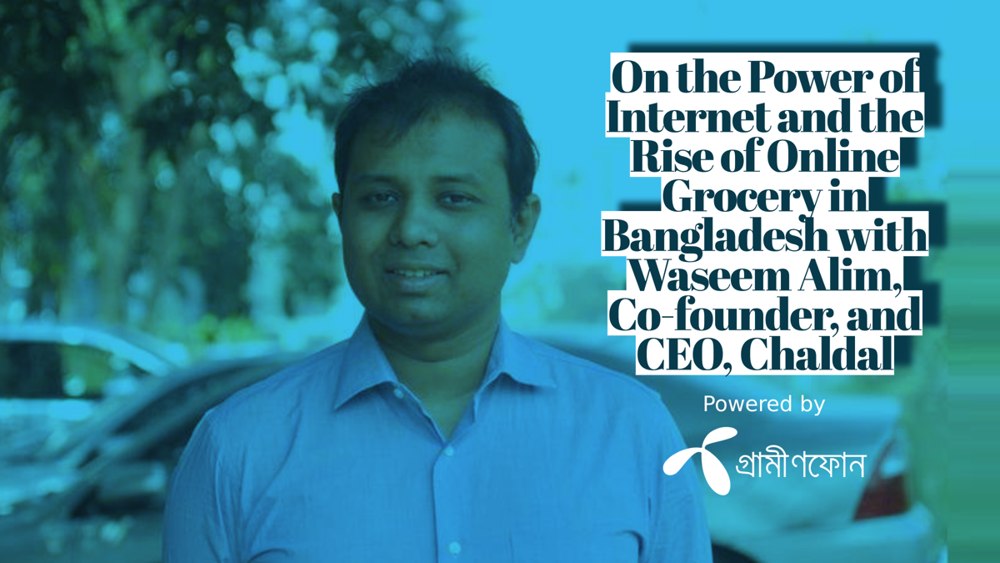
Welcome to our new series Possible If You Want, powered by Grameenphone, exploring the power and possibilities of the internet. Over the perhaps last 20 years, the internet has reshaped our world. Today, we communicate and connect differently. We shop and consume differently. We build companies and solve problems differently. The internet has penetrated and transformed almost every area of our lives.
This series is about our innate possibilities, the power of the internet, and what happens when we bridge the two. We’ll be interviewing some of the country’s successful technology entrepreneurs and learn about their vision, their take on the power and possibilities of the internet, how they personally and their businesses use technology to tackle some of the pressing problems of our society and much more.
All the stories will be exclusively published in Future Startup and you can find them here.
Coronavirus pandemic has fast-forwarded the future of ecommerce across markets. Of ecommerce verticals, online grocery has gained the most from the pandemic induced rise in online shopping. Online grocery companies like Chaldal have seen an unprecedented growth in the past two quarters of 2020 amid the coronavirus pandemic and have become essential services. These companies have helped consumers to stay at home and maintain social distancing and thus helping contain the spread of the virus. The rise of companies like Chaldal is a testament to the power of the internet from the perspective of both the consumers and entrepreneurs.
In this excellent interview, Chaldal Co-founder and CEO Waseem Alim, explains how online grocery has turned into an essential service for consumers across the board amid the coronavirus pandemic, how the internet has transformed our lives and work and enabled individuals to access resources and pursue opportunities that were hard to access before, his work at Chaldal, how Chaldal has enabled consumers to shop and consume safely amid the pandemic, the work we needed to do in order take the benefits of the internet to an even greater number of people in Bangladesh, and much more.
Chaldal is the largest online grocery business in Bangladesh. The company, which started as a small online grocery ecommerce in 2013, has since evolved into a food behemoth and today, has many verticals complementing the grocery at the center of it all.
The marketplace business, with which Chaldal started its operation, has grown and morphed into a micro-warehouse led on-demand delivery model where it helps urbanites to have their groceries and basic necessities delivered at their doorsteps. Today, the company has 12 micro-warehouses across Dhaka city and a mothership warehouse of 30,000 sq feet and continues to experience excellent growth in orders. From the beginning of coronavirus pandemic, Chaldal has played an important role in ensuring access to daily necessities for a large number of people in Dhaka.
About a year ago, Chaldal made a major decision to put itself deeply into the vegetable supply chain. The decision gave birth to Chaldal Vegetable Network (CDVN) that works directly with farmers establishing a direct backward linkage for Chaldal allowing it greater control over the supply chain. CDVN also works with smallholder retailers across Dhaka where it supplies vegetables to smallholder retailers that they would otherwise have to collect from Kawran Bazar and similar wholesale markets. CDVN works closely with these smallholder retailers, maintains a record of their transaction with CDVN, and helps them access formal financial support such as Bank Loan using the transaction data that these smallholder retailers did not have access to before working with Chaldal.
On the warehouse and logistics side, the company has been working with small digital retailers offering them both warehousing facilities and logistics support. To work with small digital retailers, it has spun off its logistics wing into Go-Go Bangla. Go-Go Bangla handles logistics for Chaldal as well as works with small online retailers to help them send their orders to customers.
Chaldal has made a strategic investment in Cookups – an online home-made food delivery service. Cookups works with women who run small micro-kitchens at their home and supply home-cooked food to businesses and consumers. The strategic move offers an excellent opportunity for Chaldal to acquire new customers for both CDVN and Chaldal marketplace. Chaldal can sell products to both Cookups home cooks as well as Cookups customers.
Another important front of Chaldal’s business now is the Rohingya Camp where the company is working with the World Food Program as a supplier. It manages certain distribution centers for WFP. While WFP remains its main customer, the company also works directly with some 26,000-30,000 families. These families collect food from Chaldal distribution points. Chaldal manages the backward linkage and supply chain for this.
These are some of the major areas where Chaldal operates. The company aims higher. “Our goal is to establish a transactional relationship with every single Bangladeshi business and household,” Chaldal Founder and CEO Waseem Alim says. “Now that could be through the Chaldal marketplace, Cookups, through our work in Rohingya camp, through CDVN, Go-Go Bangla, etc.”
Waseem Alim graduated from the Wharton School, University of Pennsylvania with a degree in Finance and Entrepreneurship and is a Silicon Valley veteran. He moved back to Dhaka and co-founded Chaldal with Zia and Tejas in 2013.
Prior to Chaldal, Waseem worked at Sigfig, a Silicon Valley financial technology startup, where he led the development of a web-based portfolio management software. He designed algorithms to monitor over $100 billion in brokerage assets held by retail investors. You can read our interviews with Waseem here.
Learn more:
